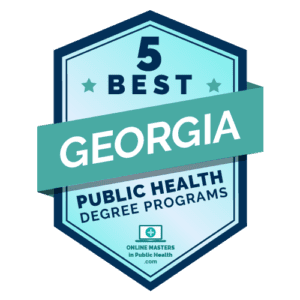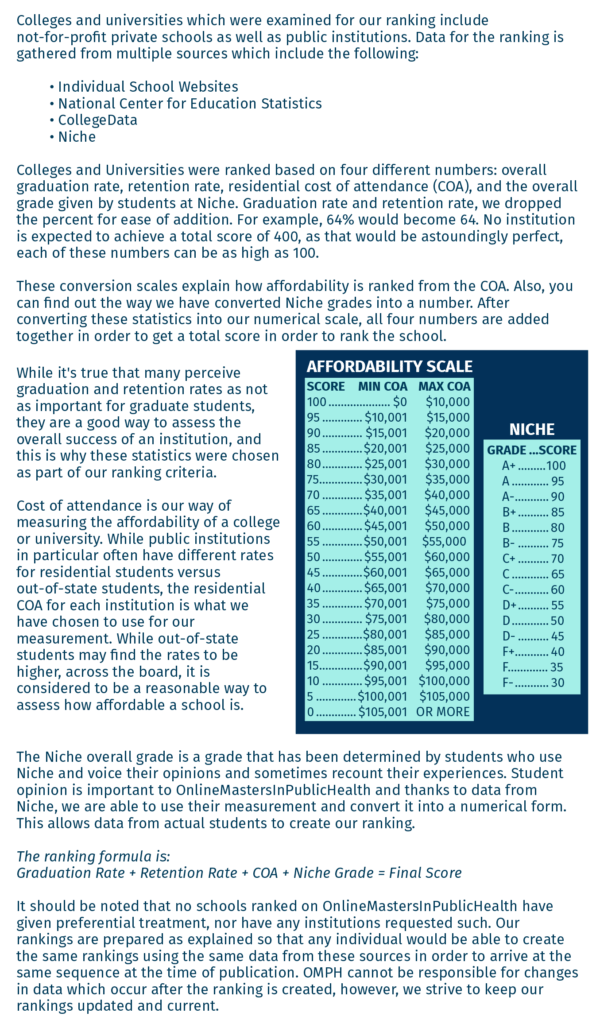 Georgia began in 1733 as a British colony, the last and southernmost of the original Thirteen Colonies. It was the final state to be restored to the Union after the Civil War. Today it is the 24th largest and the 8th most populous of the 50 states. According to the United States Census Bureau, over 10.4 million people were living in Georgia as of 2017. That’s an increase of over 2 million people since 2001. This large, rising population has been paired with the 6th highest state in poverty rankings, giving it significant public health needs. To make matters worse, 19% of the population in Georgia is uninsured. The state deserves way better, and one avenue to impact life quality in Georgia is through working in public health.
Georgia began in 1733 as a British colony, the last and southernmost of the original Thirteen Colonies. It was the final state to be restored to the Union after the Civil War. Today it is the 24th largest and the 8th most populous of the 50 states. According to the United States Census Bureau, over 10.4 million people were living in Georgia as of 2017. That’s an increase of over 2 million people since 2001. This large, rising population has been paired with the 6th highest state in poverty rankings, giving it significant public health needs. To make matters worse, 19% of the population in Georgia is uninsured. The state deserves way better, and one avenue to impact life quality in Georgia is through working in public health.
According to the Georgia Department of Public Health, the leading killer of state residents aged 45 and older is ischemic heart and vascular disease. Major public health problems that impact Georgia residents include:
- Obesity
- Smoking
- Limited access to care
- Diabetes
- Drug use
- Lack of nutritional training
Georgia ranks 38th on U.S. News & World Report’s public health rankings by state. It ranked extremely low in infant mortality (47th), mortality (38th), obesity (31st) and mental health (31st). All of these are areas in which Georgia needs some serious help.
Georgia Public Health Degree Program Methodology
In building the ranking for The 5 Best Public Health Degree Programs in Georgia, we here at OnlineMastersinPublicHealth scoured Georgia to find all of the Public Health degree programs available throughout the state. We then followed a standard methodology which we explain below. In some cases, incomplete data from our sources may cause an institution to be excluded from the ranking.

1. University of Georgia
Athens, Georgia
 UGA is a gigantic, public research university, and flagship of the University System of Georgia. It was founded in 1785 and is one of three schools that claim to be the oldest in the country. Over 37,600 students attend UGA, which has a considerably low 17:1 student-to-faculty ratio given its size. It’s made up of 17 schools that offer over 140 programs. It tied for 16th among all public national universities in the 2018 U.S. News & World Report rankings and was put in both Princeton Review and Kiplinger’s top 10 for value. UGA’s athletic teams, the Georgia Bulldogs, compete in NCAA Division I with significant success and offer 19 varsity teams to students (8 men’s and 11 women’s). Its vast alumni network (over 275,000 living former students) has 26 governors, many federal and state judges, U.S. and state senators and representatives, nine Pulitzer Prize winners, Medal of Honor winners, Hall of Fame athletes, Fortune 500 CEOs, and many other notable members throughout its ranks. In 2017-18, graduate tuition for UGA was:
UGA is a gigantic, public research university, and flagship of the University System of Georgia. It was founded in 1785 and is one of three schools that claim to be the oldest in the country. Over 37,600 students attend UGA, which has a considerably low 17:1 student-to-faculty ratio given its size. It’s made up of 17 schools that offer over 140 programs. It tied for 16th among all public national universities in the 2018 U.S. News & World Report rankings and was put in both Princeton Review and Kiplinger’s top 10 for value. UGA’s athletic teams, the Georgia Bulldogs, compete in NCAA Division I with significant success and offer 19 varsity teams to students (8 men’s and 11 women’s). Its vast alumni network (over 275,000 living former students) has 26 governors, many federal and state judges, U.S. and state senators and representatives, nine Pulitzer Prize winners, Medal of Honor winners, Hall of Fame athletes, Fortune 500 CEOs, and many other notable members throughout its ranks. In 2017-18, graduate tuition for UGA was:
- $8,704 for in-state students.
- $24,692 for out-of-state students.
UGA’s College of Public Health offers students a 12:1 student-to-faculty ratio, a strong research focus, and a 92% completion rate. It offers a number of Public Health degrees. They include:
- B.S.’s in Environmental Health and Health Promotion, in addition to five minors related to public health.
- An MPH program with concentrations in Biostatistics, Disaster Management, Environmental Health Science, Epidemiology, Gerontology, Health Policy and Management, and Health Promotion and Behavior, and M.S.’s in Biostatistics and Environmental Health.
- Ph.D.’s in Biostatistics, Environmental Health, Health Promotion, and Epidemiology.
- A DRPH program.
- The Double Dawgs Program, which allows students to take their first year of graduate public health coursework during their final year of undergrad, allowing them to earn their Master’s in Public Health in just one year after completing their undergraduate requirements.
- Graduate dual degree programs include an MBA-MPH, JD-MPH, MD-MPH, PharmD-MPH, MSW-MPH, and DVM-MPH.
- Two undergraduate certificates (Disaster Management and Global Health), and four graduate certificates (Gerontology, Global Health, Infectious Disease Epidemiology, and Disaster Management).
If you like UGA and want to request more information, go to their prospective students page.
You can visit the program wepage for more details. Also, if you’re interested in UGA’s MPH program you can email mph@uga.edu to request more info.
2. Emory University
Atlanta, Georgia
 Emory University is a private research university in Atlanta. It was founded in 1836, in Oxford, Georgia by the Methodist Episcopal Church and named for Methodist bishop John Emory Athens. Emory is the second-oldest private school in the state, and one of 50 of the oldest in the country. It’s comprised of the Emory College of Arts and Sciences, Oxford College, Goizueta Business School, Laney Graduate School, its School of Law, School of Medicine, Nell Hodgson Woodruff School of Nursing, Rollins School of Public Health, and the Candler School of Theology, among other regional campuses and its online presence. Emory Healthcare is the largest healthcare system in the state and makes up seven hospitals. Emory has been ranked 16th in the country in endowment, 21st in the world by endowment, 21st on the “National Universities” ranking and 71st on the “Global Universities” ranking by USNR in 2018. According to U.S. News & World Report’s 2018 rankings. Over 14,200 students attend Emory, which has a very low 9:1 student-to-faculty ratio. Emory athletic teams are called the Eagles, and they offer 18 varsity sports teams competing in NCAA’s Division III University Athletic Association (UAA). Notable alumni include 35th Vice President of the United States Alben Barkley, golfer Bobby Jones, NASA astronaut Sonny Carter, actress Kirsten Haglund, and former Speaker of the House of Representatives Newt Gingrich. In 2017-18 graduate tuition for Emory was:
Emory University is a private research university in Atlanta. It was founded in 1836, in Oxford, Georgia by the Methodist Episcopal Church and named for Methodist bishop John Emory Athens. Emory is the second-oldest private school in the state, and one of 50 of the oldest in the country. It’s comprised of the Emory College of Arts and Sciences, Oxford College, Goizueta Business School, Laney Graduate School, its School of Law, School of Medicine, Nell Hodgson Woodruff School of Nursing, Rollins School of Public Health, and the Candler School of Theology, among other regional campuses and its online presence. Emory Healthcare is the largest healthcare system in the state and makes up seven hospitals. Emory has been ranked 16th in the country in endowment, 21st in the world by endowment, 21st on the “National Universities” ranking and 71st on the “Global Universities” ranking by USNR in 2018. According to U.S. News & World Report’s 2018 rankings. Over 14,200 students attend Emory, which has a very low 9:1 student-to-faculty ratio. Emory athletic teams are called the Eagles, and they offer 18 varsity sports teams competing in NCAA’s Division III University Athletic Association (UAA). Notable alumni include 35th Vice President of the United States Alben Barkley, golfer Bobby Jones, NASA astronaut Sonny Carter, actress Kirsten Haglund, and former Speaker of the House of Representatives Newt Gingrich. In 2017-18 graduate tuition for Emory was:
- $40,800 for all students.
Emory offers Bachelor’s, Master’s and Doctoral public health programs in a whopping 19 different specializations. They include:
- A BA/MPH and BS/MPH program in Public Health with Math/Computer Science and Public Health with Environmental Sciences and Environmental Health respectively.
- 9 MPH dual degrees in disciplines like Divinity, Business, Bioethics, Nursing, Theological Studies, and more. There are also other dual MPH/doctoral programs.
- PhD programs in Environmental Health Sciences, Epidemiology, Nutrition and Health Sciences, Health Services Research and Health Policy, Biostatistics, and Behavioral Sciences and Health Education.
- An Executive MPH program that combines online classwork and onsite sessions, and comes in three tracks: Applied Epidemiology, Applied Public Health Informatics, and Prevention Science. Most of the coursework in this program is completed online, and students have only two short on-campus sessions per semester.
You can visit the program webpage to learn more about it. Prospective students should be sure to request more information from Emory if you’re interested in their programs.
3. Agnes Scott College
Decatur, Georgia
 Agnes Scott is a women’s private liberal arts college based in Decatur, Georgia. It was founded in 1889 by the Presbyterian Church. It’s one of the Seven Sisters of the South (a group of southern women’s colleges). It offers
Agnes Scott is a women’s private liberal arts college based in Decatur, Georgia. It was founded in 1889 by the Presbyterian Church. It’s one of the Seven Sisters of the South (a group of southern women’s colleges). It offers
34 majors and 31 minors, along with other degrees through partnerships with other colleges. Students graduate with a Bachelor of Arts degree or a Bachelor of Science degree, depending on major. Some of its partner schools like Emory University, Georgia Tech and Georgia Institute of Technology offer dual degrees in Nursing, Engineering, Computer Science, and Business programs in conjunction with Agnes Scott. There are also two masters partnerships offered with the Georgia Institute of Technology’s M.B.A. program and Emory University’s Master of Public Health Program. Over 900 students attend the school, which has a 10:1 student-to-faculty ratio. U.S. News & World Report’s 2018 rankings put Agnes Scott 2nd in Most Innovative Schools (National Liberal Arts Colleges), 61st among National Liberal Arts Colleges, and 22nd on its Great Schools, Great Prices List. Agnes Scott athletic teams are called the Scotties, and field six teams competing in the National Collegiate Athletic Association Division III. Notable alumni include Ila Burdette, the first Georgia Rhodes Scholar, Jean H. Toal, Chief Justice of the South Carolina Supreme Court, Marsha Norman, playwright, and many others.
In 2017-18, undergraduate tuition at Agnes Scott is:
- $39,960 for students regardless of their residence.
Agnes Scott offers a major and minor in public health. Students will:
- Take graduate classes at Emory University’s Rollins School of Public Health.
- Earn credits that count towards their undergraduate and graduate study of public health.
- Have opportunities to participate in internships at the Centers for Disease Control and Prevention, CARE, the American Cancer Society, and the Carter Center.
- Assist with lab research, build health communication materials, work with community health organizations and/or study disease and transmission.
- Potentially develop their own independent research projects (48 students have been supported in doing so since 2006).
- Students can graduate with MPH level public health skills, be prepared to enter top graduate programs to complete their MPH, and/or get permanent public health positions.
Students will be prepared to enter a wide range of graduate and professional programs in medicine, human rights, public policy, and the natural and social sciences, while also receiving a solid Liberal Arts Education.
You can visit the program webpage here for more details or to request more info about Agnes Scott’s public health program.
4. Georgia College and State University
Milledgeville, Georgia
 Georgia College & State University, or simply Georgia College or GCSU, is a public liberal arts university in Milledgeville, Georgia. It was founded in 1889 and is a member of the University System of Georgia. The school was established as a women’s college but became coeducational in 1967. Just under 7,000 students attend the school, which has a 17:1 student-to-faculty ratio. It’s been ranked 10th in the region among top public schools by USNR, and 31st among Best Regional Universities in the South. Its athletic teams are called the Georgia College Bobcats. GCSU is a member of NCAA Division II and the Peach Belt Conference. It currently offers varsity teams in baseball, men’s and women’s basketball, cheerleading, men’s and women’s cross country, golf, dance team, women’s soccer, softball, men’s and women’s tennis, volleyball, and collegiate bass fishing. Notable alumni include across Tanvi Ganesh Lonkar, GEICO CEO Tony Nicely, and the writer and essayist Flannery O’Connor among others.
Georgia College & State University, or simply Georgia College or GCSU, is a public liberal arts university in Milledgeville, Georgia. It was founded in 1889 and is a member of the University System of Georgia. The school was established as a women’s college but became coeducational in 1967. Just under 7,000 students attend the school, which has a 17:1 student-to-faculty ratio. It’s been ranked 10th in the region among top public schools by USNR, and 31st among Best Regional Universities in the South. Its athletic teams are called the Georgia College Bobcats. GCSU is a member of NCAA Division II and the Peach Belt Conference. It currently offers varsity teams in baseball, men’s and women’s basketball, cheerleading, men’s and women’s cross country, golf, dance team, women’s soccer, softball, men’s and women’s tennis, volleyball, and collegiate bass fishing. Notable alumni include across Tanvi Ganesh Lonkar, GEICO CEO Tony Nicely, and the writer and essayist Flannery O’Connor among others.
In 2017-18, undergraduate tuition and fees at Georgia College are:
- $9,346 for in-state students.
- $28,060 for out-of-state students.
Georgia College offers a Public Health B.S. that rose out of its previous B.S. in Community Health. The program began in 2016. Students will learn to:
- Understand health and disease based on public health methods and principles.
- Use social, behavioral, policy and educational interventions to aid population health.
- Assess the needs of particular populations.
- Build strategies that cause positive health behavior changes, and much more.
In topics covered include:
- Epidemiology
- Global Health
- Environmental Health
- Public Health Policy
- Research Methods
You’ll also have opportunities for internships, research, scholarships and to join campus organizations.
You can find the program webpage here. Remember to request more information about Georgia College and you can email Dr. Barbara Funke barbara.funke@gcsu.edu to contact Georgia College’s public health staff directly.
5. Mercer University
Macon, Georgia
 Mercer is a private university in Macon, Georgia. It was founded in 1833 and is the oldest private school in the state. The school comprises 12 colleges and schools including liberal arts, business, engineering, education, music, continuing and professional studies, law, theology, medicine, pharmacy, nursing, and health professions. It’s known for its Mercer University Health Sciences Center which oversees Mercer’s medical, pharmacy, nursing, and health professions programs. U.S. News and World Report has ranked Mercer as the second highest private University in Georgia for the past 25 years, and it has outranked every private college in Georgia for the last 25 years according to USNR. Over 8,600 students attend Mercer, which has a 13:1 student-to-faculty ratio. Mercer’s athletics teams are called the Bears, and they offer eight men’s and ten women’s sports that compete in NCAA Division I. Notable Mercer alumni include the current Governor of Georgia, the Chief Justice of Georgia, three members of the Georgia Court of Appeals, the Mayor of Macon, and the President of the State Bar of Georgia.
Mercer is a private university in Macon, Georgia. It was founded in 1833 and is the oldest private school in the state. The school comprises 12 colleges and schools including liberal arts, business, engineering, education, music, continuing and professional studies, law, theology, medicine, pharmacy, nursing, and health professions. It’s known for its Mercer University Health Sciences Center which oversees Mercer’s medical, pharmacy, nursing, and health professions programs. U.S. News and World Report has ranked Mercer as the second highest private University in Georgia for the past 25 years, and it has outranked every private college in Georgia for the last 25 years according to USNR. Over 8,600 students attend Mercer, which has a 13:1 student-to-faculty ratio. Mercer’s athletics teams are called the Bears, and they offer eight men’s and ten women’s sports that compete in NCAA Division I. Notable Mercer alumni include the current Governor of Georgia, the Chief Justice of Georgia, three members of the Georgia Court of Appeals, the Mayor of Macon, and the President of the State Bar of Georgia.
In 2017-18, graduate tuition and fees at Mercer are:
- $14,670 for students regardless of residence.
Mercer offers a BSPH and MPH program. The BSPH:
- Tackles the underlying science of human health and disease.
- Teaches fundamental concepts about program installment, planning, assessment, and evaluation while working on health issues.
- Gives students an understanding of legal, ethical, economic, and regulatory aspects of health care and public health policy.
- Lets graduates leave with a Council on Education for Public Health (CePH) accredited degree that can be used for entry-level employment in public health, taking graduate level public health courses, and more.
The MPH at Mercer:
- Can be taken itself, or in the following dual programs: DPT/MPH, PharmD/MPH, MMSc/MPH, and PsyD/MPH.
- Teaches students how to improve access to health care, control infectious diseases, reduce environmental hazards, violence, substance abuse, and injury.
- Mercer’s generalist MPH program leaves students open to continue their careers in the public health as educators, epidemiologists, biostatisticians, journalists, researchers, administrators, environmentalists, demographers, social workers, laboratory scientists, and attorneys, or in other positions, using their foundational Mercer public health education as a springboard to the rest of their public health career.
- The 42-credit MPH can be taken entirely online, without on-campus requirements.
You can check out the program webpage here for more details or request more information about Mercer’s public health programs.
Georgia Public Health Degree Programs – In Conclusion
Before confining yourself to public health degree programs in Georgia, take a look at some of the top MPH programs in the country. We’ve ranked them here, on our Top 25 Online MPH Programs ranking.
You might also consider some of the other terrific options in Georgia for higher education in public health. These include:
- Georgia State University in Atlanta which offers multiple Public Health Degrees at varying levels of education.
- Georgia Southern University in Statesboro also offers multiple Public Health Degrees in varying levels of education.
- Armstrong Atlantic State University which is now Georgia Southern University in Savannah offers a Masters in Public Health Degree.
- Augusta University, formerly Georgia Regents University, in Augusta also offers a Master of Public Health Degree, and it can be completed 90% online and 10% on campus.
- Morehouse School of Medicine in Atlanta offers a Master of Public Health Degree.
Don’t forget to check out our rankings on online Biostatistics MPH degree programs. We’ve also ranked the online Bachelor’s in Public Health Degree Programs, and Online Master’s Degree in Health Administration programs. Prospective students should request more info for any program you’re interested in.